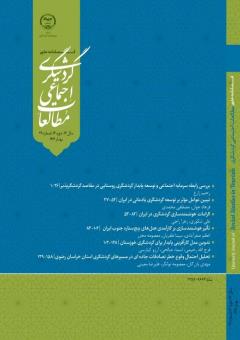الزامات هوشمند سازی گردشگری در ایران
محورهای موضوعی : مطالعات اجتماعی و گردشگری، جامعه شناسی گردشگری
1 - برنامه ریزی اجتماعی، دانشکدۀ علوم اجتماعی، دانشگاه تهران، تهران، ایران.
2 - برنامه ریزی اجتماعی، دانشکده علوم اجتماعی، دانشگاه تهران، تهران، ایران.
کلید واژه: گردشگری هوشمند, هوشمند سازی, تحلیل زمینه ای, فناوری های ارتباطی و اطلاعاتی,
چکیده مقاله :
روند رو به رشد هوشمندسازی گردشگری با روند رو به رشد تغییرات جهانی در حال شکلگیری است. با اینحال، همگامسازی صنعت گردشگری با تحولات سریع نوین و هوشمندسازی آن امری است که بدون مداخلات برنامهریزی شده میسّر نخواهد شد. ازاینرو، ضرورت دارد الزامات مرتبط شناخته شوند تا بسترسازی صحیحی جهت شکلگیری آن صورت پذیرد. صاحبنظران و فعالان حوزۀ گردشگری و هوشمندسازی از مهمترین منابع اطلاعاتی جهت کسب اطاعات در این خصوص به شمار میروند. به این منظور، در پژوهش حاضر تلاش شده با اتّکا به روش کیفی و ابزار مصاحبۀ بدون ساختار به شناسایی الزامات شکلگیری این نوع گردشگری در ایران از منظر این گروه پرداخته شود. همچنین به منظور تحلیل دادههای حاصل از مصاحبه، از روش تحلیل محتوا گرفته شده است. یافتههای پژوهش نشان میدهند الزامات در قالب مقولاتی از قبیل «ارزیابی»، «هوشمندسازی خدمات گردشگری»، «حکمرانی هوشمند»، «توانمندسازی افراد»، «همسویی سیاستها»، «توسعه عوامل فنی و زیرساختی» و «رفع محدودیتها» قابل ساماندهیاند.
The growing trend of smart tourism development is emerging alongside the rapid pace of global changes. However, aligning the tourism industry with modern, rapid transformations and its smart development is a process that cannot be achieved without planned interventions. Therefore, it is necessary to identify the relevant requirements to create a proper foundation for its formation. Experts and practitioners in the field of tourism and smart development are considered the most important sources of information in this regard. To this end, the present study sought to identify the requirements for the promotion of this type of tourism in Iran from the perspective of the mentioned group, applying a qualitative method. Moreover, the required data were collected through unstructured interviews, which were then analyzed via content analysis. The findings of the study revealed that the requirements can be organized in the form of categories such as evaluation, smartization of tourism services, smart governance, empowering individuals, alignment of policies, development of technical and infrastructural factors, and removal of restrictions.
